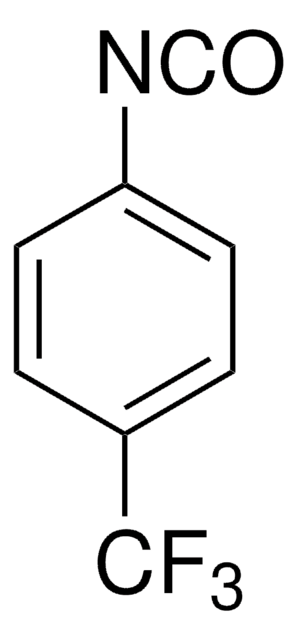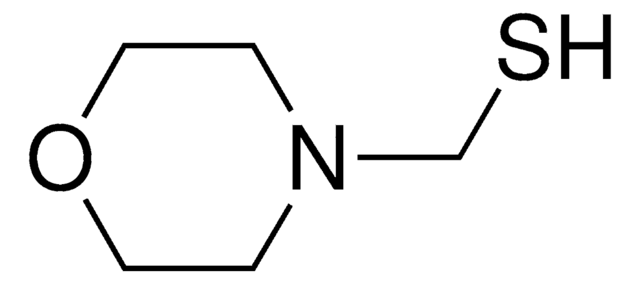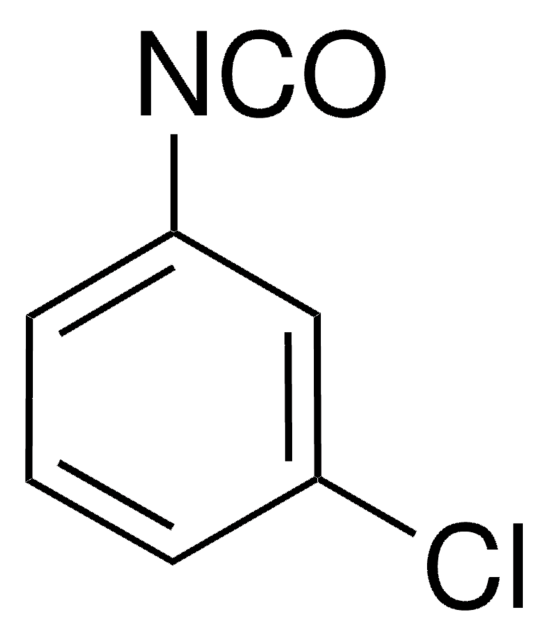374857
3,5-Bis(trifluoromethyl)phenyl isocyanate
98%
Synonym(s):
1-Isocyanato-3,5-bis(trifluoromethyl)benzene, 3,5-Di(trifluoromethyl)phenyl isocyanate
About This Item
Recommended Products
Quality Level
Assay
98%
form
liquid
refractive index
n20/D 1.43 (lit.)
density
1.476 g/mL at 25 °C (lit.)
functional group
fluoro
isocyanate
SMILES string
FC(F)(F)c1cc(cc(c1)C(F)(F)F)N=C=O
InChI
1S/C9H3F6NO/c10-8(11,12)5-1-6(9(13,14)15)3-7(2-5)16-4-17/h1-3H
InChI key
NRSSOFNMWSJECS-UHFFFAOYSA-N
Application
- Chemical derivatization of amino-functionalized model surfaces.
- Preparation of arylaminothiocarbonylpyridinium zwitterionic salts, via an exothermic reaction with 4-pyrrolidinopyridine.
- Synthesis of (S)-3-hydroxymethyl-2-methoxymethoxy-2′-(3-(3,5-bis(trifluoromethyl)phenyl)uryl-benzyl)-1,10-binaphthalene.
- Synthesis of 1-[3,5-bis(trifluoromethyl) phenyl]-3-(2-pyridyl)thiourea, via reaction with 2-amino pyridine in MeCN.
Signal Word
Danger
Hazard Statements
Precautionary Statements
Hazard Classifications
Acute Tox. 4 Dermal - Acute Tox. 4 Inhalation - Acute Tox. 4 Oral - Eye Irrit. 2 - Resp. Sens. 1 - Skin Irrit. 2 - Skin Sens. 1 - STOT SE 3
Target Organs
Respiratory system
Storage Class Code
6.1C - Combustible acute toxic Cat.3 / toxic compounds or compounds which causing chronic effects
WGK
WGK 3
Flash Point(F)
154.4 °F - closed cup
Flash Point(C)
68 °C - closed cup
Personal Protective Equipment
Choose from one of the most recent versions:
Already Own This Product?
Find documentation for the products that you have recently purchased in the Document Library.
Customers Also Viewed
Our team of scientists has experience in all areas of research including Life Science, Material Science, Chemical Synthesis, Chromatography, Analytical and many others.
Contact Technical Service













![1-[3,5-bis(trifluoromethyl)phenyl]-3-[(1R,2R)-(-)-2-(dimethylamino)cyclohexyl]thiourea AldrichCPR](/deepweb/assets/sigmaaldrich/product/structures/236/021/d944889d-2233-4700-9f2c-caa3652d0124/640/d944889d-2233-4700-9f2c-caa3652d0124.png)
![(R)-N-[(1R,2R)-2-(3-(3,5-Bis(trifluoromethyl)phenyl)ureido)cyclohexyl]-tert-butyl-sulfinamide 96%](/deepweb/assets/sigmaaldrich/product/structures/389/070/18847164-c6a7-4b4e-abcb-2dbc22493a2d/640/18847164-c6a7-4b4e-abcb-2dbc22493a2d.png)